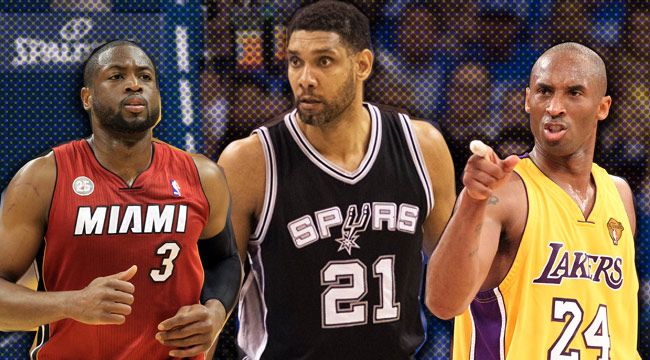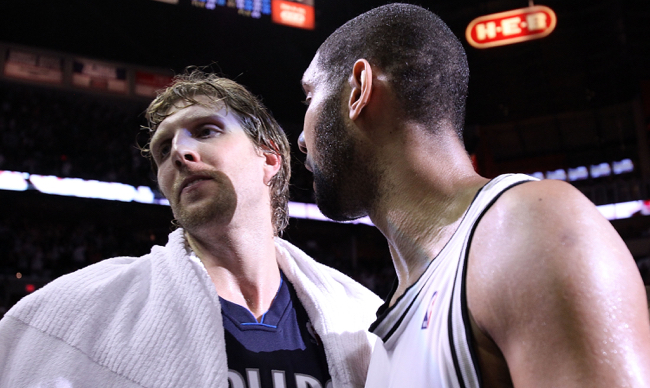
This has been one of the wildest and most unpredictable free-agency periods in NBA history. There’s the Durant sweepstakes and the insane contracts being signed due to the raised salary cap. But there were two stories everyone pretty much ignored because we figured we knew where they were heading: Dirk Nowitzki opting out of the final year of his contract with the Dallas Mavericks, and Dwyane Wade having contract spats with Pat Riley and the Heat.
We’ve seen these stories before, but it’s been pretty much assumed that no matter what drama comes in the offseason, Dirk and D-Wade would end their careers with the teams that drafted them. Everything seemed to be falling into place when Dirk re-signed with the Mavs for $40 million over two years — a contract that is as much a thanks for taking prior pay cuts for the betterment of the team, as it was a deal for his expected output going forward. Wade was bickering with the Heat, but the general consensus was that he would re-sign. Until he didn’t, and ended up with his hometown Chicago Bulls.
Dirk and Wade’s contracts have set the end of their vocation on vastly different paths, and brings up questions about how franchises should handle their superstars as their careers come to an end. Of course, it’s impossible to discuss this question without talking about how the Lakers decided to send Kobe Bryant off into the sunset or, on the other end of the spectrum — the perfect farewell the Spurs gave Tim Duncan.
There may never be a perfect storm of team/player partnership than the Spurs and the publicity-averse Duncan.
Los Angeles was universally panned when it gave Kobe Bryant a $48.5 million two-year farewell contract to end his career when the former MVP was coming off an injury-shortened season. And it’s easy to see why the contract was so controversial. Giving that kind of money to a player who clearly couldn’t perform like a max player anymore not only hurt the team’s ability to load up on major free agents, but it created an environment where superstars wouldn’t even sit at a table with the Lakers to take a meeting.

As a result, the Lakers have spent the last two seasons in a dumpster, trying to grab franchise draft picks, inexplicably letting walking anachronism Byron Scott coach, and trying to keep the ship afloat with a seemingly inept Jim Buss running player operations. The team’s future resides in the hope that D’Angelo Russell or Brandon Ingram turn into the players that can make the team a playoff contender sometime this decade, and an outside shot at Russell Westbrook coming as a free agent. And it’s possible to tie the Lakers’ current troubles directly back to that Kobe contract.
But whether Kobe got his massive contract, Buss would still be the guy making personnel decisions. There was an assumption that once Bryant left the Lakers, the team would finally get to court big superstars. Remember Stephen A. Smith swearing on a stack of Bibles that Kevin Durant was heading there this offseason, despite the fact Kevin said it was a lie (before Stephen A. actually threatened him on air)? Well, the free agency season came and went and Buss opened up proceedings by offering Timofey Mozgov an absurd four-year $64 million contractminutes after they were allowed to talk to him.
The Mozgov signing raises a big question: who’s to say that Jim Buss would have used the available cap money from a less-lucrative Kobe contract for any relatively smart signing? Blaming the Lakers’ failures on the Kobe contract is putting faith in Jim Buss as a Lakers executive. Are we sure we want to do that?
On the flip side, the Lakers were able to give Kobe Bryant a sendoff that was a perfect cap to his career. Sure he had a horrible final year and didn’t make the playoffs, but that 50-shot, 60-point finale against Utah is going to go down as one of the most magical nights in Staples history. And in the end, isn’t that part of the goal of how you want a player to end his career? There’s something to be said for Kobe Bryant not having to end his career like the Ewings and Olajuwons of years past who had to suffer their final years as afterthoughts on different teams.
Plus, Kobe more than made up for the deal with his star power. No one was going to see games these last two seasons for anyone other than Bean.
https://media.giphy.com/media/3o7ZeH4O9eHDXVMbN6/giphy.gif
Dirk Nowitzki looks to be getting a similar sendoff while ending his career with the Mavericks. Dirk joined the team when he was 19 — he’s spent as many years as a Dallas resident as he has a resident of Germany — and it seems like his farewell is the best of both worlds. Nowitzki is getting repaid for all of the times he took less money for Dallas to pursue free agents, and he’s staying on a team that is likely to make the playoffs. Dirk, though, is seemingly less concerned with the chest-thumping that comes with a lucrative contract as much as he is concerned with being a constant championship contender. And even though the Mavs have been able to secure cap space and create playoff teams, they haven’t been able to turn that cap space into any top free-agent prospects. They most notably whiffed on bringing Dwight Howard and Deron Williams over when they had the space and chance to create a mega-team, only getting D-Will after injuries had ravished his prime.
Instead, Mark Cuban and company have had to settle for huge Chandler Parsons and Harrison Barnes contracts. And they signed Rajon Rondo for a disastrous three-quarters of a season. The Mavericks have been perennial easy first-round outs since winning a championship in 2011, which means Dirk plays into late April and early May, but has left the team incapable of securing any meaningful lottery picks in that span.
Dirk will end his career as a Maverick. And his final time on a basketball court will probably be the fourth, fifth or sixth game of a first-round series in two years.
Unlike Dirk and Kobe, Dwyane Wade won’t be ending his career as a member of the team with which he started. Instead, he’s heading back home to Chicago after the end of his relationship with Pat Riley and the Heat front office. When Bosh and James joined the Heat in 2010, Wade chose to take less money to make the team work within the cap and allow them to sign Udonis Haslem. Then Wade again opted out of a contract so the Heat would have space for LeBron James to re-sign in 2014. All he wanted at the end of his career was repayment for those sacrifices.
Then when the Heat decided to lowball him right out of the gate, offering him a ludicrously low $10 million a year in a summer where everyone was getting paid because of that cap spike. Then, the Heat renounced their franchise cornerstone’s Bird rights so they could afford to offer incumbent center Hassan Whiteside a max deal. Because they renounced his Bird Rights, when the Chicago Bulls and Milwaukee Bucks came into the picture and offered Wade closer to what he’s worth in this current market, they didn’t have the cap room to match those offers. Wade is gone and the Heat have a gaping hole in their franchise.
Sure Wade isn’t nearly the franchise-carrying star he was in year’s past, but losing him did major long-term damage to Pat Riley and the Heat mystique. Ever since the franchise brought Alonzo Mourning back to end his career and gave him a front-office position, they’ve been characterized as an organization that takes care of its own. The Miami Mafia was the selling point for the franchise. Even with so much working against them in the Durant negotiations, they were given an outside shot at signing him strictly off the strength of Riley’s magic and the allure of the Heat franchise. Now they can’t even secure the city’s biggest star anymore largely because of a refusal to take care of him at the end of his career. And that hit to a reputation is hard to recover from.
It’s easy to criticize Miami for not just punting on the last two post-LeBron years by giving Wade gigantic contracts and tanking. Maybe it was arrogance or a desire to get back at LeBron for leaving that led Riley to want to push the team a championship by adding Dragic and re-signing Bosh instead of letting him walk to Houston and allowing the team to simply take a couple of years as a losing team and rebuild post-Wade. But let’s not forget: The Miami Heat were Eastern Conference contenders if not for an unforeseen Chris Bosh blood clot that’s doomed their last two years. The Heat, especially in 2015-2016 had a team that — with a healthy Bosh — could have challenged Cleveland in the East. They took Toronto to seven games without Bosh and they could have challenged Cleveland in the Eastern Conference Finals with a full squad. And who knows? Maybe Durant sees healthy Chris Bosh, spry Dwyane Wade and capable Dragic and decides to head to South Beach in an easier East for a few years. I think it was certainly worth the risk to try to compete for two years and get Durant. But the Bosh blood clots doomed them.
Right now, the Heat, Mavs and Lakers are all struggling to find answers for what to do after their stars leave. Which is pretty typical for most franchises in any sport. The difficulty in the decisions for them is to figure out how to reach that balance of keeping the stars happy, not losing the faith of the fans and trying to find the quickest path to the next era of prosperity.
So which franchise handled their waning star situations the best?
- The Lakers, who threw everything in the Dumpster, but created a lasting final moment we’ll never forget.
- The Mavs, who have a superstar who’s staying and a team that’s mediocre, which may be the worst spot for a franchise to be.
- The Heat, who saved cap space to sign younger talent, but maybe ruined their reputation by refusing to keep their most popular star.
The answer is easy.

The Spurs and Tim Duncan.
All you have to do is find great players late in the draft every year, win 50 games every year for the better part of two decades and be a title contender up until your star’s very last game. It’s so easy. Why can’t more teams just do that?






